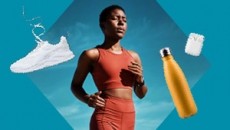Special Edition: Drinks Ingredients
Exploring drinks innovation for health and wellness
According to market researcher Zenith International, functional drink sales rose three percent in 2008 to 26.5bn litres – albeit somewhat impacted by the recession. Nevertheless, innovation is still strong, and drinks makers have been looking to new ingredients to deliver the benefits that consumers demand.
One emerging area of innovation has been probiotics and prebiotics in non-dairy drinks, which are now second only to dairy products for product launches containing the gut-friendly bacteria. Non-dairy beverages accounted for 10.7 percent of the global pre- and probiotics market in 2008, according to Datamonitor figures.
Danisco, for example, which has long provided cultures for dairy-based drinks, entered the probiotic juice category in January. The company explained that although fermented dairy has been considered the ideal vehicle for delivery of probiotic strains to the human gastrointestinal tract, its applications specialists had been working on inoculating probiotic strains into juices. Test results have shown that it can obtain a good survival of its probiotic strains in fruit juice over 40 days at 4°C, the company said.
In terms of prebiotics, said to create a balanced microflora environment in the gut where probiotic bacteria like bifidobacteria and lactobacilli can flourish, prebiotic fibres have been gaining increasing attention.
France-based acacia gum specialist Colloides Naturels International extended its Fibregum range in March to include Fibregum Clear, a soluble version made of at least 90 percent soluble fibre with a “strong prebiotic effect”, according to the company.
Healthy sports drinks
While there has been an upswing in sales of drinks with “good for you” ingredients, sales of sports drinks have slumped. In the United States, for instance, sales fell 12.3 percent last year, according to Beverage Marketing Corporation figures. However, coconut water – the clear liquid from the centre of young green coconuts – has emerged as a healthy alternative to the big energy drinks that have traditionally dominated the sports drink market. Coconut water sales are booming as fitness enthusiasts look to the low-calorie drink for its natural electrolytes, vitamins and minerals.
The drink’s image has also been enhanced with a host of recent celebrity endorsements, including one from Madonna early this year, when she invested $1.5m in Vita Coco, one of the leading players on the American market.
Apart from electrolytes, research has also shown that dairy proteins have potential post-exercise benefits. Arla is one company that has taken a twist on this, recently announcing it has been working on developing juices with added milk proteins.
The company’s dairy group application manager Claus Andersen said: “After a workout, milk proteins are those best absorbed in the muscles, giving an increase in muscle mass.”
But Arla envisages that a juice drink offering many of the benefits of milk could also be appealing to young people who may prefer the taste of juice to milk, or to older people seeking extra milk protein and calcium.
Sugar-free
Meanwhile, beverage makers have become increasingly aware that it is not enough to market drinks for their healthy benefits if consumers perceive them to be outweighed by caloric sweeteners. And with a move toward all things ‘natural’, artificial zero-calorie sweeteners may not always appeal to consumers looking for healthy choices.
For many manufacturers, natural zero-calorie sweeteners like the sugar alcohol erythritol and, more recently, stevia-derived sweeteners, are seen as attractive alternatives for drinks marketed on their health benefits.
In Europe, the first examples of the latter are just beginning to emerge. In France, Swedish company Liv Natur has launched a stevia-sweetened Yerba Maté drink, marketed on a healthy platform. It has been researched for its potential to increase alertness (it contains mateine, a caffeine-like substance), fat burning effects, and satiety effects.
Stevia, too, has an association with good health as it has a low glycaemic index.
In the growing and fast-moving healthy beverage sector, there is plenty of further potential for manufacturers to find a niche, and new opportunities continue to appear, whether in the form of pro- and prebiotics, soluble fibre, dairy proteins, zero-calorie sweeteners, or free-from claims.










